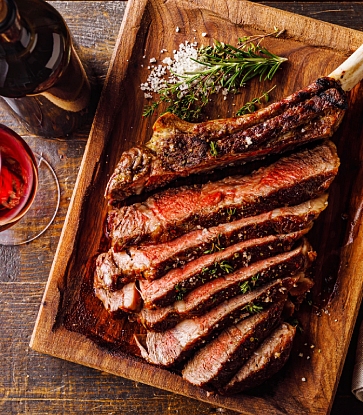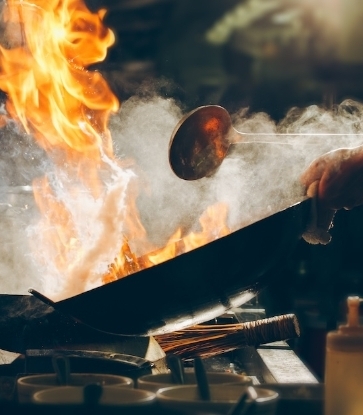Steak often makes the home cooks’ menu when they prepare a dinner to impress the guests. It looks simple enough on the outset, but with a quick-fire dish like this, any tiny mistake will be amplified. Enter Eric Tulay, executive chef of Feather & Bone. Working at the gourmet grocery shop-cum-restaurant famous for a rich selection of meat products, homemade sausage and dry-aged beef, he offers chunks of wisdom to all carnivores.

Freshness is paramount. In my opinion, grain-fed beef tastes better. If you’re choosing a rib eye, go for a piece with a little fat attached to it, so the fat would release a strong aroma to elevate the rich meat flavour.
As you touch the meat with your finger, it should feel smooth and bouncy. Sirloin is leaner in comparison, and there are other underrated cuts of beef worth steak lovers giving them a try.
The most important factor is the resting time, which should equal the duration of cooking. If you spend five minutes frying the steak, you should spend another five minutes resting it before serving. With a premium piece of meat, not much seasoning than salt and pepper is needed. Make a sauce with the meat juice released from cooking.
How can you tell a steak is cooked properly?
The golden standard for a well-cooked steak is a beautifully charred surface and tender interior. You need to attend to the conditions of meat all the time while it’s cooking. For those who don’t have a large grill at home, a grill pan with a ribbed bottom would suffice to create a satisfactory result. It’s not necessary to brush the pan with butter before cooking. Rather, adding a bit of butter on the steak right before you finish cooking would help it caramelise, yielding a golden crust and deep fragrance.

1) Take the steak out from the fridge and let it warm up in room temperature for a while.
2) Rub salt and pepper on the steak to season.
3) Decide the cooking time based on the steak’s thickness and your preferred doneness.
4) If you are using a pan with a ribbed bottom, turn the steak 90 degrees to create the latticed pattern.
5) Flip the steak and repeat steps 3 and 4.
6) Put the steak on a plate and let it rest for however long it is cooked.
7) Add a little salt and pepper, as well as the meat jus to finish.

Cooking steak with stone and salt blocks has become a popular trend. What’s the reason behind?
It comes down to how heat is distributed. I’m more used to using traditional equipment. There are many variables behind new cooking methods like stone block, salt block and sous vide. Cooking has a lot to do with respect: respecting the diner, respecting the ingredient. If you treat the steak like your girlfriend, it would naturally come out delicious.
What are some side dishes people can easily prepare at home?
There are lots of options! My favourites are mashed potato, French fries, asparagus and baked potato.




















